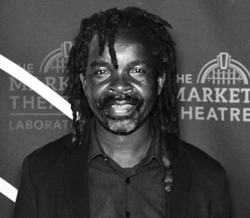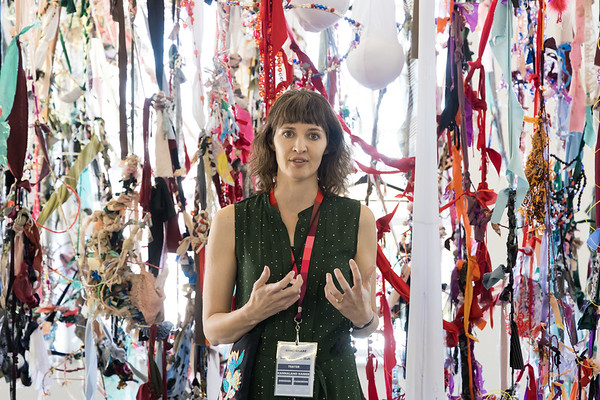Art talks, theatre, exhibitions and activation of food garden project at the KKNK Festival
By Edward Tsumele at the KKNK Festival in Oudtshoorn

Yesterday the KKNK Festival went a notch up from Friday’s momentum as three key events formed the highlights of the festivities. In the morning members of the media accompanied ABSA officials as they visited a school in a predominantly underprivileged part of Oudtshoorn, the township of Toekomsrus, where ABSA in collaboration with Real Gardening activated a food garden project within Bongolethu Primary School premises, donating seeds for learners.
Members of the community will also assist as volunteers, taking care of the garden once it is up and running, protecting it from possible vandalism, particularly over the weekends when there is no schooling. A project leader demonstrated how easy it is to plant vegetables, using innovative methods of food production that comes with the seed package, developed by an expert and package appropriately.
The project, which is part of ABSA’s sustainability drive project called Possibilities Unearthed priorities sustainable living, and according to John Tshabalala from ABSA, the project is national and more similar activations will follow in the area involving local communities. Tshabalala is Managing Executive Western Cape and Eastern Cape, Relationship Banking at ABSA.
“The project is about sustainable living, especially for communities that have been left badly affected by the past two years of Covid-19 devastation. But at the core of this project is food gardening. The idea here is to work with local communities who must take ownership of the project. In this case we are working with Real Gardening, who are experts in food gardening. Under the Possibilities Unearthed project, we also assist Small and Medium Enterprises (SMMEs) which have been affected by Covid-19,” Tshabalala told CITYLIFE/ARTS in an interview at the launch of the project on Saturday (see another article in this edition) at Emthonjeni township.
After the food gardening project launch, we were taken to another event associated with the KKNK Festival, and this time this was a project that offered food for thought, an inclusive exhibition at the Prince Vincent Gallery, which showcased the works of emerging artists as well as post modernist masters. The exhibition also featured two of 2019 winners of the ABSA L’Atelier Awards, including NKhensani Rihlampfu.
His giant sculptures made up of rope and wood, which seek to pose the question of contested reality, interrogating whose reality should stand, attracted attention in this gallery at they take centre space. The artist uses these sculptures as representing hidden histories under the roots of trees, especially when it comes to the ownership of land, particularly for displaced communities. Curators Sarah McGee and Yoyisani Magwebu lead the talks. The two curators also spoke afterwards at another event about the issue of evaluating art, especially pertaining to both the primary and secondary markets.

We were also taken to a theatrical production in another part of town in a community where there was theatre and an exhibition, both of which deal with the history of colonialism and how that history’s legacy still defines itself in community issues that threaten to tear the fabric of society and make inequalities even more visible till today in the different communities found in the area. The exhibition and the theatrical piece involved community members and are a result of a six month research project undertaken in the different communities of this town.
The issues raised by the piece are real, the acting talent was wonderful to watch as their acting skills are polished and managed to make these issues a reality to the audience that attended. The cast was given a standing ovation as a result. Rendered mainly in Afrikaans, a dominant language in this area, the play, the visual exhibition and the 400 page research material will form part of the archives of the area, and therefore will assist in preserving the intersection of colonial history and modern South Africa in this area.
There are also plans in the future to digitize this archival material putting it online to allow for public access. What is unique about this project is that it allows the members of the community to participate in the narrative of their own communities, instead of outsiders doing it for them. Letting outsiders tell the story of any community risks the danger of incorrect information being passed for truth.










